Hospital: series one
Imperial College Healthcare NHS Trust featured in a documentary, following staff and patients at its hospitals, broadcast on BBC Two throughout January and February
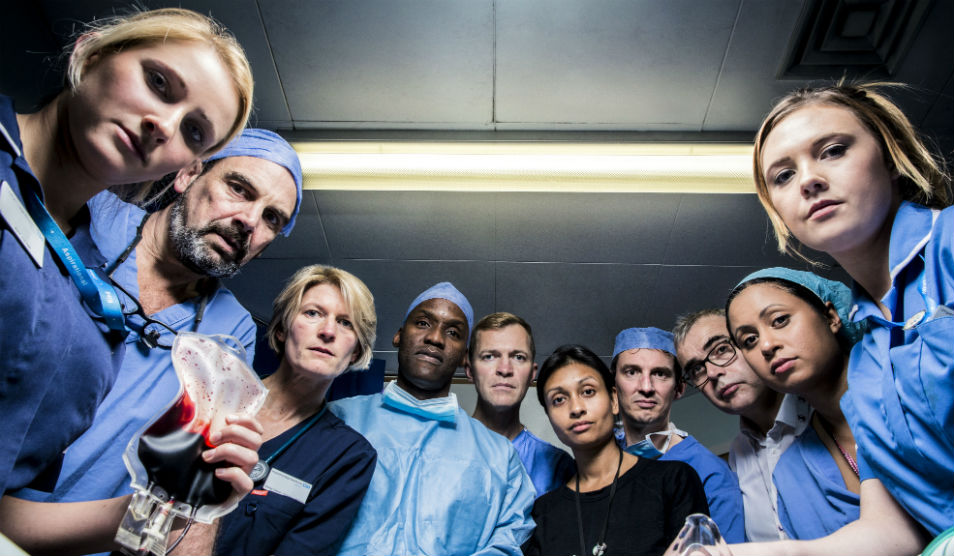
The first series of Hospital, a six part series, was a ground-breaking documentary that went behind the scenes of one of the largest and busiest NHS trusts in the UK.
Hospital - episode one
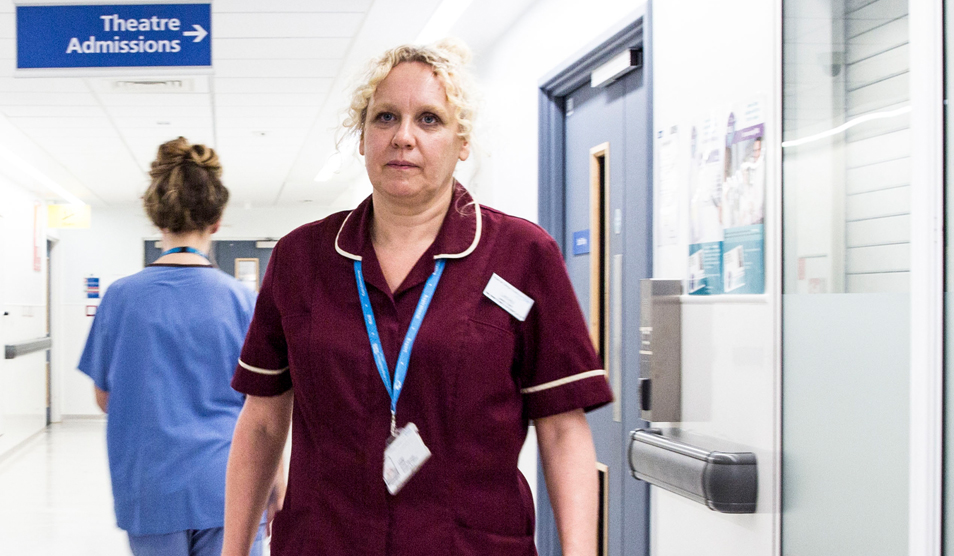
Episode one explores hospital capacity, following clinicians and managers as they plan for potential surges in demand, especially as winter approaches. St Mary’s status as one of London’s four major trauma centre means this is a particularly complex process.
The footage documents the story of two patients, Janice and Simon. Janice requires specialist emergency surgery to save her life following a ruptured aneurism; Simon needs a major operation to remove a tumour in his oesophagus - both patients will require an intensive care bed following their surgery. The episode shows staff as they work to create capacity within the intensive care unit at St Mary’s Hospital so that both operations can go ahead. Following the admission of an A&E patient with a major trauma, only one more intensive care bed can be made available safely. The clinical decision is made to go ahead with the emergency surgery that Janice needs to save her life. Simon’s operation is postponed until the next day.
Hospital – episode two
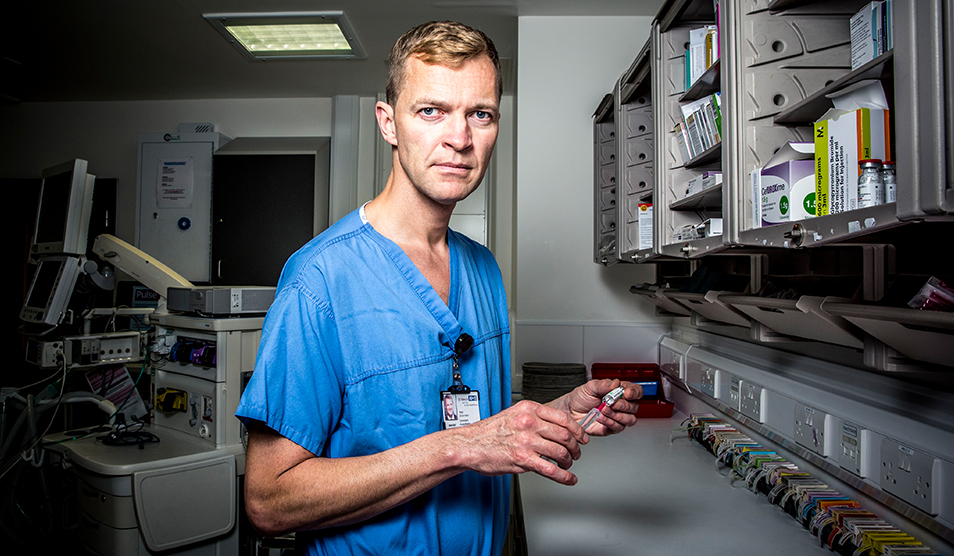
Episode two explores capacity pressures across all levels of beds, and looks further at the impact of not being able to discharge patients promptly when they are medically fit to leave. It shows how it’s not a straight forward case of treat and discharge for our patients who are frail and vulnerable, who are making up an increasingly large proportion of admissions. Their health conditions require on-going management to prevent them worsening again to crisis point, and they often need additional social care support to be able to leave hospital safely.
In this episode we see the work of the Trust’s discharge team who work with patients, their families, carers and external partners to ensure that patients can be safely discharged from hospital at the right time. Ninety-two year old Dolly is at St Mary’s following a fall which saw her break both ankles. While Dolly is medically fit to be discharged she could not safely return home and is in need of a temporary nursing home placement until she is fully recovered.
The cameras also follow the story of a homeless man who cannot speak English. One of our discharge nurses has to ensure the patient understands the plans being put in place to keep him well as he is also medically fit to leave hospital.
Meanwhile, a team of top surgeons, anaesthetists and nurses has been put together to perform one of the biggest operations that will take place at the Trust this year. The team will be operating to surgically treat a large aneurysm. The team includes two consultant vascular surgeons, three anaesthetists, a perfusionist, a cardiac surgeon, a general surgeon and four scrub nurses. The patient, Peter, will also require an ITU following his surgery as it is a major procedure.
The episode also shows the story, of a young man, Harry, who has fallen three floors down a lift shaft and needs emergency care for a suspected brain injury.
Hospital – episode three
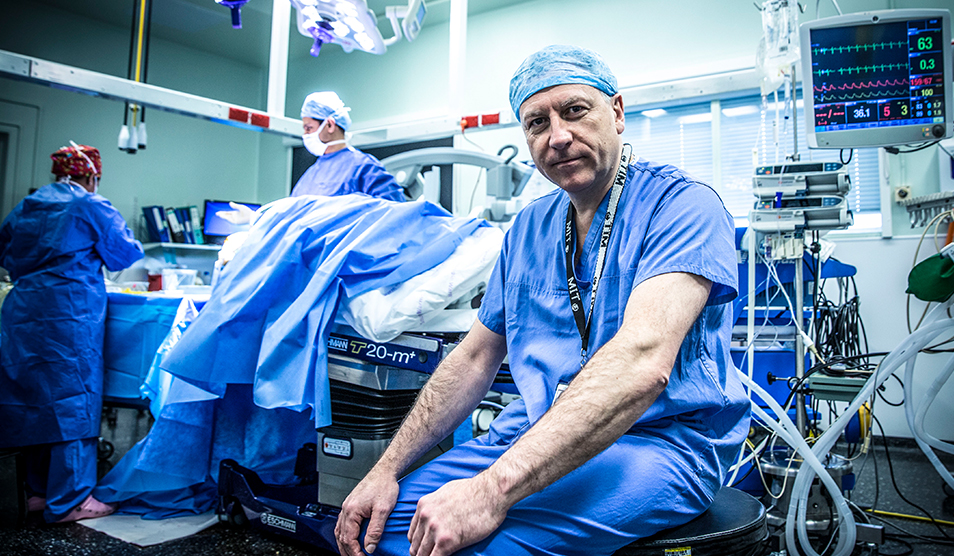
Episode three follows the stories of three patients being treated by consultant neurosurgeon Kevin O’Neill at Charing Cross Hospital in Hammersmith. Two are due to have planned surgery, and one is a new patient who needs emergency surgery.
Valerie the first of the two patients booked in for surgery, is being treated for several small aneurysms in her brain. Kevin performs Valerie’s operation successfully, though it is more complex than expected and an intensive care bed has to be made available in case of complications. This means another patient’s complex surgery has to be cancelled as there is too much pressure on ICU capacity. Despite Valerie’s operation over running, Kevin is still able to perform surgery on David, his second planned patient for the day, who needs a spinal procedure to treat back pain.
The next day, Kevin is due to operate on Phil as an emergency as his fast-growing brain tumour is causing increasing paralysis. However, another, more critical case comes in, preventing Phil’s surgery from going ahead. As Kevin’s team is not scheduled to operate until the following week, and there is growing concern about Phil’s paralysis, Kevin arranges for Phil’s operation to go ahead the next day, Saturday.
The episode also shows the first UK clinical trial of MRI-focused ultrasound to treat essential tremor. The trial – initially for 20 patients – was made possible by a £1million grant from Imperial College Healthcare Charity. It sees patient, Selwyn, cured of a long-term, debilitating tremor in his right hand using a non-invasive brain surgery technique. The procedure uses high intensity focused ultrasound waves to penetrate the scull to break the faulty circuit within the brain causing tremor without the use of scalpels or any form of cutting. The clinicians involved in the trial talk about the procedure as a potential ‘game changer’ for neurosurgery, including for the treatment of brain tumours.
View a clip from episode three
Hospital – episode four
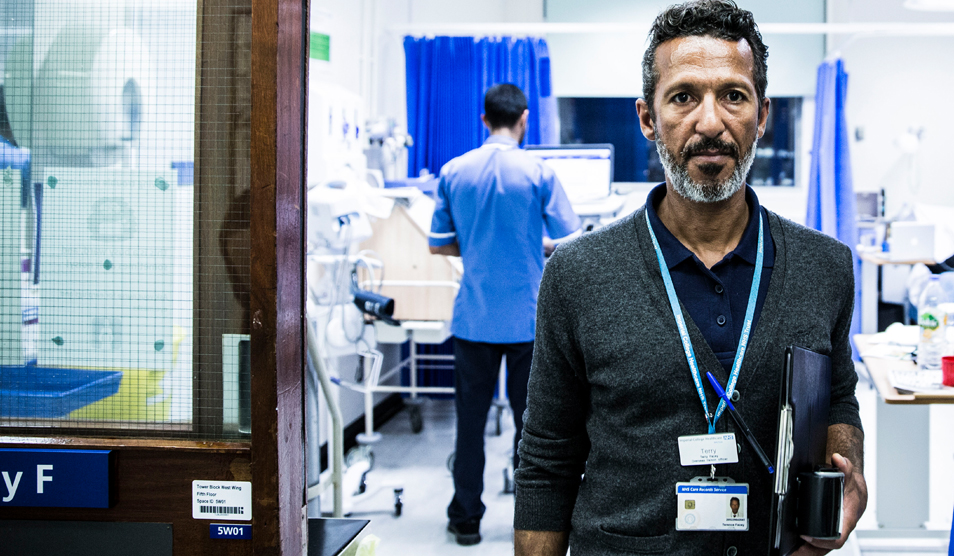
Episode four takes a look behind the media headlines at NHS care for non-UK residents. It shows how everyone who requires emergency care is provided with that care, in the same way, regardless of where they are from. It also shows the work of the Trust’s overseas patients’ team who are responsible for identifying patients who are not eligible for free NHS care and recouping the costs of their treatment.
The episode focuses primarily on the stories of two overseas patients. The first is Sonia, visiting her sister, a UK resident, for a holiday. She needs an emergency quadruple heart bypass after coming into A&E with chest pain. The second patient is Priscilla, who goes into premature labour with quads on a flight back to her home country of Nigeria.
Both Sonia and Priscilla are visited by Terry, part of the Trust’s overseas’ patients team. It’s Terry’s job to identify patients who are not eligible for free NHS care and to work with them to arrange payment.
Hospital – episode five
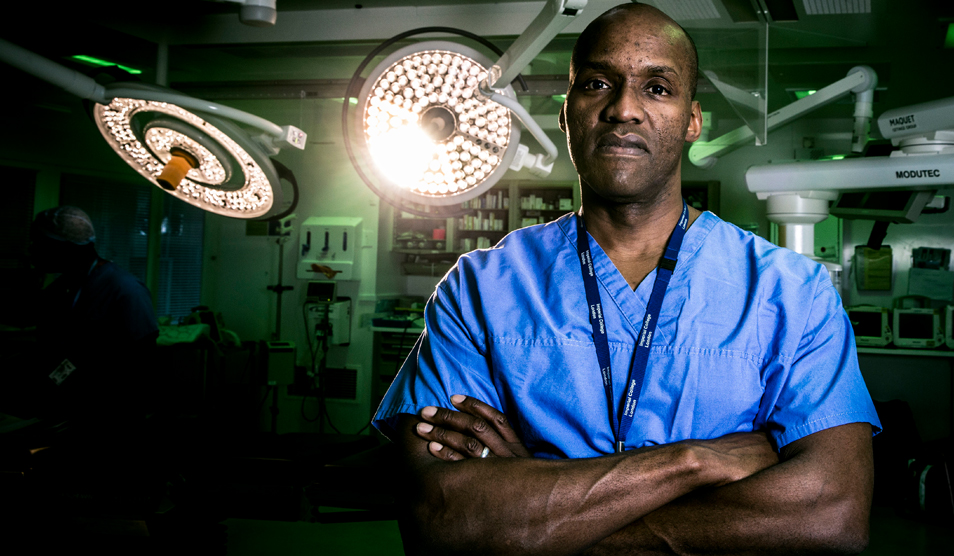
Episode five explores the impact of an ageing population on the NHS and how increasing need sits alongside the use of increasingly advanced technologies that are helping to save lives while also putting more financial pressure on the service.
Eighty-seven-year-old Gerry is brought to Charing Cross Hospital’s A&E after suffering a stroke. He is immediately seen by doctors from the hyper acute stroke unit who decide that he is suitable to receive a thrombolysis injection to break down and disperse the blood clot in his brain. It is later found that Gerry has a narrowing in his carotid artery – the main blood vessels that supply the head and neck. Clinicians discuss the benefits and risks for Gerry to have surgery to unblock his arteries, an operation that could prevent future strokes, but in his case also carries a high risk.
At Hammersmith Hospital, ninety-eight –year-old John is scheduled to have a transcatheter aortic valve implantation, known as TAVI, to replace a narrowed aortic valve in his heart. This relatively new procedure is offered to patients who are too high risk for open heart surgery. John has only been to hospital once before, 50 years ago to remove a varicose vein. He successfully receives his TAVI but while on the operating table suffers a stroke. He is immediately transferred to the hyper acute stroke unit Charing Cross Hospital. The team determine he requires a thrombectomy which involves threading a catheter through the groin to the brain to remove a clot with a small mechanical device.
This episode also looks at sickle cell disease. Eighteen-year-old Deborah has been waiting seven years to find a suitable donor for a bone marrow transplant. Her brother Sam is a 50 per cent match. This would previously have ruled him out as a donor but, thanks to a pioneering new treatment, he is now able to donate. The episode charts Deborah’s treatment as she undergoes chemo and radio therapy to suppress her immune system before having the transplant, as well as looking at how Sam feels as he prepares to become a donor.
View a clip from episode five
Hospital – episode six
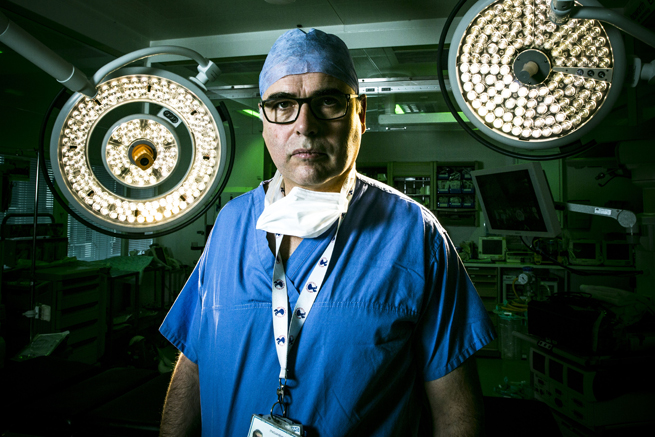
The Trust performs over 500 operations across 19 surgical specialties every week. In episode six we follow the stories of four patients who all require surgical treatment.
Trauma patient Reno, 52, has a fractured pelvis due to a motor cycle accident. He requires an urgent four to five hour operation to fix the fracture. Consultant orthopaedic surgeon, Mr Angus Lewis must cancel his elective patient in order to treat Reno. Angus travels from Charing Cross Hospital to St Mary’s Hospital, but on arrival he finds the theatre list has unexpectedly overrun, so he is unable to start the procedure. Reno’s operation is rescheduled and successfully completed two days later.
84-year old Betty has been diagnosed with bowel cancer. Before consultant surgeon George Reese can perform the surgical procedure to remove the cancer he must find Betty a high dependency bed so that she can recover after the surgery. George finds Betty a suitable bed in theatre recovery, so the procedure goes ahead.
Elective patient, 41 year old Daniel is due to have weight loss surgery at the Imperial weight loss centre. He is currently 27 stone and has a BMI just short of 50. Weight loss surgery will improve his health and bring his life expectancy back to normal. Daniel has been waiting for his surgery for a year and a half. In order for the procedure to go ahead, Dr Ahmed Ahmed, bariatric surgeon must find a bed so that Daniel can recover after surgery.
We also meet Jen, 31 who is donating a kidney in order for her husband Elliot, who has 5 per cent kidney function, to receive a kidney transplant. Jen is unable to donate her kidney to Elliott, but Jen is able to donate through the UK Living Kidney Sharing Schemes (UKLKSS). Vassilios Papalois, head of renal surgery and Frank Dor, head of renal transplantation and consultant surgeon successfully complete the two surgical procedures.
About this page
- Last updated
